|
Heathwatch |
Coordinated and compiled by Edward
Aranbewela |
Our ‘stylish’ lives and obesity!
We live no more as we desire... We live for our employers, friends,
neighbours and you name others. It’s not a problem of morals we are
going to tell you about. Rather, it’s a problem of lifestyle changes
that we are more concerned. It’s all about our so called “stylish”
lifestyles which make us fat and obese.
Gone are the days of men sweat on physical work in work places and in
houses. Gone are the days women laboured on kitchen duties. We have
machines to work for us and we are slaves of machines. We do not climb
stairs, but we wait for the elevators. We do not walk a short distance
but wait for a vehicle. We do not move and our lives move on ...
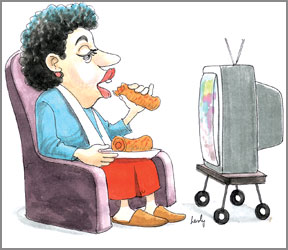
This life style without physical activities is number one danger for
the development of obesity. It is wise to note that physical activity
and exercise are two different things. One article quotes the
distinction as follows:
“Physical activity can be defined as any bodily movement that
increases energy expenditure and can include job-related activity,
household chores, and leisure time activity. Exercise, on the other
hand, is considered a subset of physical activity that is planned,
structured, and repetitive with the purpose of improving physical
fitness”.
It is understood that, unlike exercise, which is planned and
structured, physical activity is what we do, day to day. It is obvious
that we are becoming less active in job related duties, household tasks
and in our leisure time spending. We burn fewer calories and accumulate
fat because of this.
Now researchers are finding facts about, increasing the physical
activity in daily chores is very much affective just like a well
structured exercise program, combined with dieting. Increasing physical
activity is not very hard to achieve if we think and act. If you use the
stair way and avoid the elevator and walk the five minute distance
instead of using your car, you are making a start!
Our so called “urban” lifestyle is making our lives’ faster and
shorter. Most city dwellers do not have a space to walk around and to do
some gardening in their limited space. Recreational activities have
changed into “easy chair” activities. Most people nowadays like watching
television, rather than going out for a walk. Playing cricket is
replaced by video games.
Fast lifestyles have made us lovers for fast food. Fast food joints
budding up in every nook and corner of town press us to eat large chunks
of oily, fatty, unhealthy food. Gone are the days, small timer herbal
drink cart along side the road offer you “kola-kendha”. Greasy and oily
stuff have arrived with French fries. Many western experts on this
subject have revealed the dangers about our modern lifestyle and related
bad eating habits.
“The main reason for the increase in the prevalence of obesity, I
believe have to do with modern lifestyle: We as a society produce food
in large quantities and people are used to eat large portions of food,”
says endocrinologist David Schteingart, M.D., associate director of the
General Clinical Research Center at the University of Michigan Health
System.
So, it is time to think differently. Time to become out-laws of
modern lifestyles. We can make smaller, but effective moves towards it
by simple lifestyle changes. Why waste money on more and more fast
foods? We can make some thing at home and live healthy. We want a
revolution of mind sets for a healthier future.
Courtesy: Slimlife Vol 6 sent by Dr. Kelum Pelpola
Cancer food pyramid
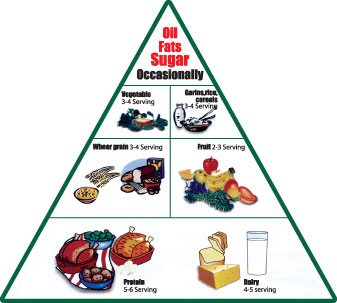
Good nutrition is especially important for people with cancer. The
guide to appropriate eating, which divides food into six key groups of
varying sizes. However the food pyramid alone may not be sufficient.
Maintaining a calorie balance is important. Choose food with more
calories and more high protein foods such as meats and dairy products.
You may need to cut high fibre foods for a while, such as a vegetables,
fruits, cereals and whole grains, if your treatment cautions diarrhoea.
Consider small frequent snacks which can be easily tolerated. Cut
back on fats, sugar, alcohol and salt.
Free Medical Meditation Health Service
Regular meditation is now accepted by most people in west as an
effective way to lead health lives, avoiding most of the stresses we
confront in life today.
So stated the widely travelled Sri Lankan Dharmachari Siri
Goonasekera in an interview with the Healthwatch on Sunday.
He said “out of all meditation practices Buddhist meditation is now
gaining ground in the post modern west and there are millions practising
this in that area in the world”.
He has opened a health promoting Buddhist Meditation Centre at No. 36
Siripa Road, Colombo 5 for those interested in trying out this
meditation therapy for good health overcoming stresses and ill health.
He could be contacted on 0777105449.
Global health watch - 2 launched
W.A. Sumathi Fernando
The Global Health Watch 2 as an alternative to the World Health
Report was launched on November 19 at the Nagarodaya Centre in Colombo
by the People’s Health Movement in association with several other
network organisations.
|
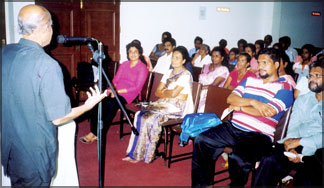
Prof. Carlo Fonseka addressing the gathering |
Sirimal Peiris of the People’s Health Movement in his initial address
thanked all the participants including the distinguished guests Prof.
Carlo Fonseka, Prof. Tissa Vitharana, Dr. K. Balasubramaniam of the Hai
Institute and Dr. Vinya Ariyarathna, Executive Director of Sarvodaya and
apprised the audience that this report has been launched in more than 22
countries in the world and invited Dr. Vinya Ariyarathna to take the
chair and conduct the proceedings.
In his address Dr. Vinya Ariyarathna mentioned that the World Health
Organisation issues the World Health Report annually to raise the health
of the masses and said that the Global Health Watch 2 contains certain
factors that are not embodied in the World Health Report and gives a
deeper analyses than the World Health Report and that it ranks high and
is a very important document worth reading.
He emphasised that the stories embodied in this report (Global Health
Watch 2) makes a revelation of the heavy burdens played on the masses
which has contributed to the deterioration of their health.
Translation of this report into Sinhala would enable the masses to
exchange a series of experiences. Minister of science and Technology
Prof. Tissa Witharana said he was able to go through only a few chapters
of the reprodute to lack of time. But he was able to grasp the value of
the contents as he was a doctor and worked in that capacity for a
considered period of time.
He said that instead of giving treatment to the root causes of
illnesses, patients are given treatment to cure the symptoms and the
patients continue to return to hospitals on a number of occasions.
He stressed the importance of prevention which means the provision of
clean drinking water, toilet facilities, good food etc. Although various
discussions are held, adequate monies are not allocated for research
work which is of utmost importance.
He said this report covers many aspects of health problems. He raised
the issue that due to the various pressures exerted, whether any person
could lead a healthy life. Drugs are being bought from other countries.
That is a trend in the whole world. He concluded by saying that due
to the collapse of the economy in the whole world and due to various
loans taken by the government and our country’s exchange earnings from
tea and rubber too have collapsed, the country’s economy has fallen into
a grave abyss.
However, the President is taking meaningful action to provide better
health facilities and the whole health system needs to be re-vitalized.
He said that this report deals with health issues, contagious diseases
and HIV/AIDS.
He pointed out that Dr. Balasubramaniam had taken a keen interest in
this book. Translation of this book in to Sinhala is a good idea.
Prof. Carlo Fonseka in his address said that he would explain how to
understand the gist of this book. He explained his own characteristics.
Loving kindness shown to all humans ie. helping all those who comes
his way, non-pollution of the environment ie. to refrain from damaging
the earth. He went on to explain that by leading such a life one could
achieve what is preached in all the doctrines.
Reduction of poverty, provision of health facilities to all beings,
provision of educational facilities to all and reduction of climate
change are universally accepted rights as given in the Universal
Declaration of Human Rights.
All these problems have arisen as those four conditions are not
strictly adhered to. 40 per cent of the world’s 6000 billion population
are extremely poor.
Due to the existence of a wealthy minority the poor have been
deprived of any wealth. Drugs smuggling is rampant.
All these have resulted in the failure to get treatment for
illnesses. Exercise is very important. Lack of exercises, addiction to
liquor and smoking contribute to a long list of illnesses such as High
Blood Pressure, Heart troubles, cancer, stroke, diabetes etc. Cigarette
manufactures are known as merchants of death he said. All these are
explained in this book in detail he said.
Sirimal Pieris expressed his gratitude to Prof. Carlo Fonseka for his
worthy views and expressed his anticipation that the encouragement shown
by the Professor in this regard would continue in the future too. Dr. K.
Balasubramaniam of the Hai Institute spoke and his speech was translated
by Vasudeva Nanayakkara.
He said that this book was valuable for the academics and it embodies
the work of multi national companies. It is the duty of a government to
provide the needs of the masses. This book serves as a guide to
implement a series of suggestions for the betterment of the health of
the masses. According to the World Health Organisation poverty is the
deadliest disease.
In Sri Lanka over 30 per cent of the under five children are
malnourished due to poverty. Over 40 per cent of pregnant mothers are
anaemic. Most of these mothers die at child birth delivering under
weight babies.
Although Sri Lanka has all the resources and all the skills it is a
sad plight that such things happen in our country.
Untidy beds can be healthy
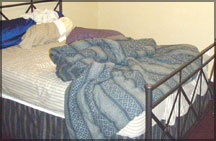 Not making your bed in the morning might actually be better for you.
It’s all to do with dust mites, which live in our beds (yours probably
contains about 1.5 million) and produce allergens that are a major
trigger for asthma. Not making your bed in the morning might actually be better for you.
It’s all to do with dust mites, which live in our beds (yours probably
contains about 1.5 million) and produce allergens that are a major
trigger for asthma.
Dust mites thrive in the warm, damp conditions of an occupied bed.
But a team at Kingston University, London, found that simply leaving the
bed unmade in the morning can help remove moisture from the mattress and
sheets, so the mites dehydrate and die.
Courtesy: Reader’s Digest Sent by Dr. Viraj Peramuna
Low dose of caffeine may damage offspring’s heart
Drinking just two cups of coffee during pregnancy may affect fetal
heart development and then reduce heart function over the entire
lifespan of the child, showed a new study by U.S. researchers.
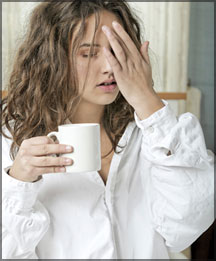
The study was conducted by a group of researchers from Yale
University and published Tuesday online in the journal of the Federation
of American Societies for Experimental Biology.
In addition, the researchers also found that this relatively minimal
amount of exposure may lead to higher body fat among males, when
compared to those who were not exposed to caffeine.
Although the study was in mice, the biological cause and effect
described in the research paper is plausible in humans, said the
authors.
“Our studies raise potential concerns about caffeine exposure during
very early pregnancy, but further studies are necessary to evaluate
caffeine’s safety during pregnancy,” said Scott Rivkees, a senior
researcher on the study.
To reach their conclusion researchers studied four groups of pregnant
mice under two sets of conditions for 48 hours.
The first two groups were studied in “room air,” with one group
having been injected with caffeine and another injected with saline
solution.
The second two groups were studied under conditions where ambient
oxygen levels were halved, with one group receiving caffeine and the
other receiving saline solution.
They found that under both circumstances, mice given caffeine
produced embryos with a thinner layer of tissue separating some of the
heart’s chambers than the group that was not given caffeine.
The researchers then examined the mice born from these groups to
determine what long-term effects, if any, caffeine had on the offspring.
They found that all of the adult males exposed to caffeine as fetuses
had an increase in body fat of about 20 percent, and decreased cardiac
function of 35 percent when compared to mice not exposed to caffeine.
“Caffeine is everywhere: in what we drink, in what we eat, in pills
that we use to relieve pain, and even in candy,” said Gerald Weissmann,
editor-in-chief of The FASEB Journal.
“This report shows that despite popular notions of safety, there’s
one place it probably shouldn’t be: in the diet of an expectant mother.”
Xinhua
Your question based on heart to heart talk on Heart Transplant
Healthwatch has arranged this talk in association with the Colombo
Apollo Hospital where Sri Lanka’s first heart transplant is to take
place shortly by Dr. Sujeeth H. Suvanna from U.K. who has done over one
hundred heart transplants there. He is now at Apollo at its heart
surgery unit.
The talk will be by this heart surgeon who at our request readily
agreed to give a ‘heart to heart’ talk based on your heart touching
questions on this field of surgery where heart surgery has developed and
expanded enabling any of us with seriously affected heart problems -live
with a donors heart.
Please give thought to this talk which is interesting and coming
under our ‘health education programme’ send us your interesting
questions based on the topic a the earliest possible.
The talk will be on at the Apollo auditorium on January 24, 2009, at
10 a.m.
Send your questions to:
Healthwatch Medical Education Talk
Heart to heart on heart transplant
Dr. Sujeeth Suvanna (Cardiothroracic Surgeon)
C\O Features Editor,
Daily News
Lake House,
No - 35,
D.R. Wijewardena Mawatha, Colombo 10.
|

